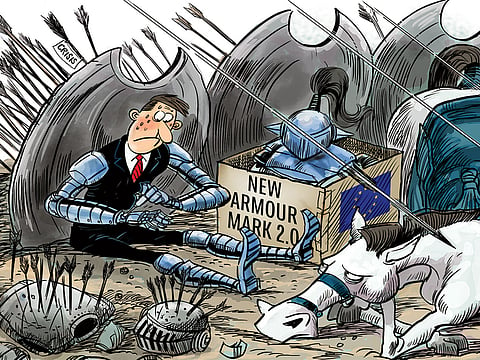Reinventing Europe
Things cannot go on like this as too much is at stake. A policy of baby steps is no longer enough

Since 2009, when the financial crisis that started in America in 2008 shook the Eurozone to its core, crisis management has become Europe’s new normal. Indeed, crisis has followed crisis in Europe and this is unlikely to change anytime soon.
Europe has had a financial crisis, a Greek crisis, a Ukraine crisis and, since the late summer of 2015, a refugee crisis. And now, with the United Kingdom, one of the European Union’s (EU) strongest member states economically and militarily, holding a referendum on June 23 on whether to leave the EU (so-called ‘Brexit’), Europe could soon be facing a secession crisis.
Indeed, a massive crisis of trust vis-a-vis Europe and its institutions has developed in most EU member states, fuelling a revival of nationalist political parties and ideas and a slackening of European solidarity. The re-nationalisation of Europe is accelerating, making this crisis the most dangerous of all, as it threatens disintegration from within.
The EU’s political leaders — the heads of state and government of the member states and the leaders of the European Council and the European Commission — made a fateful decision in the wake of the financial crisis. They placed their trust in crisis-mode management, rather than developing a vision for Europe and a strategy to achieve it.
Strategic management of Europe would have required making the necessary compromises, which no doubt would have entailed political risks in all member states. Instead, EU leaders chose to let the reality of the various crises do the work for them, placing their faith in the force of circumstances. But this approach, born of cowardice and misplaced cunning, had its price, too: To its citizens, an EU that moves only in crisis mode is the very image of incompetence, unworthy of their confidence — no longer the solution to the old continent’s problems, but simply another problem.
After almost six decades of successful integration, Europe has become a large feature of everyday life — a political, economic, institutional, and legal reality. But all of Europe’s manifestations depend on the vitality of its underlying idea, of its soul. If this idea dies among Europe’s citizens and peoples, the EU will come to an end, not with a bang but with a long, torturous whimper.
Things cannot go on like this; too much — the future of our continent in a world of rapid change — is at stake. A policy of baby steps is no longer enough. Without a renewed vision of Europe and an effective approach to dealing with crises, the continent’s new (and old) nationalists will continue to gain in strength and jeopardise the entire project of peaceful integration on the basis of the rule of law.
New political guise
The Brexit referendum will point the way, both for the UK and for the EU as a whole. It will be followed either by sighs of relief (as I hope) or a cataclysm that rocks the EU to its core and brings disaster to the UK. But, however, the British decide, Europe’s numerous crises need to be addressed.
The financial crisis is anything but over; it has only taken on a new political guise. Portugal, Spain, and Ireland have shown that democratic majorities are no longer willing to endure the cure-or-kill treatment of austerity politics. And the Greek crisis is coming to a boil again.
The euro may not survive. Despite signs of a moderate economic recovery in the Eurozone, the gap between Germany and most other Eurozone countries is widening and deepening. There is no longer any talk of convergence in the monetary union, and there hasn’t been for a long time.
And yet it is clear that if the euro fails, the whole European project will fail with it. Europe’s leaders know that the euro is still anything but crisis-proof, despite technical improvements achieved during the previous crisis. Unless a renewed grand compromise is reached between Germany and other Eurozone countries, it never will be. In practice, this would mean reforming the Eurozone on the basis of deeper political integration — obviously no mean feat.
The same applies to the EU’s joint security, protection of external borders, and a reformed European refugee policy. Here, too, effective political leadership requires a renewed vision for a united Europe in the 21st century — what it can and must provide, how it should be constituted, and what institutions and powers it requires.
There is no reason for Europe to fear crises. They set things in motion and provide an opportunity for the EU to move forward and become stronger, provided one faces them without fear of the accompanying political risks.
Once the UK has spoken this June, Europe must give its answer — courageously and with a vision and real solutions. Nationalism is not the answer. Only genuine Europeans can ensure a peaceful, prosperous future for Europe.
— Project Syndicate, 2016
Joschka Fischer, Germany’s foreign minister and vice chancellor from 1998 to 2005, was a leader of the German Green Party for almost 20 years.


